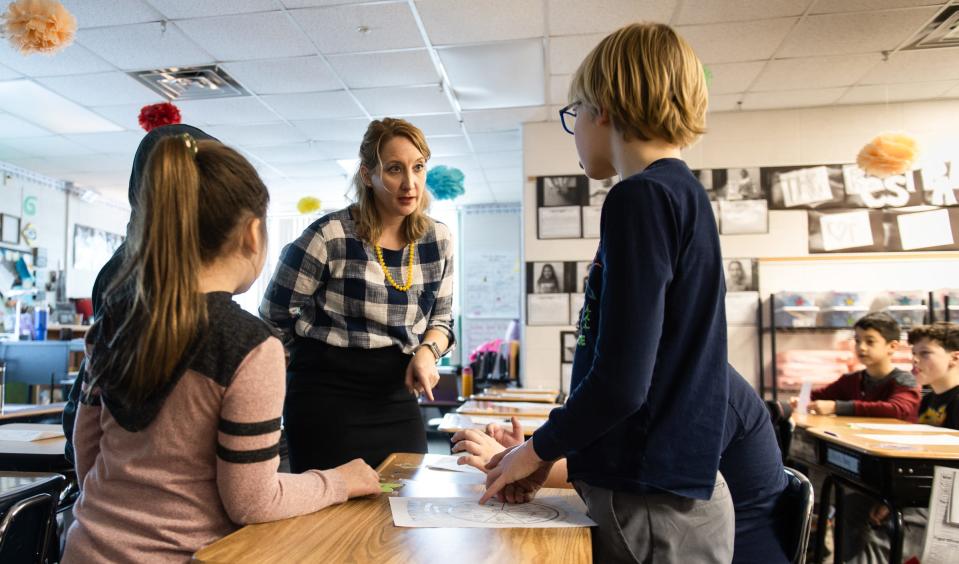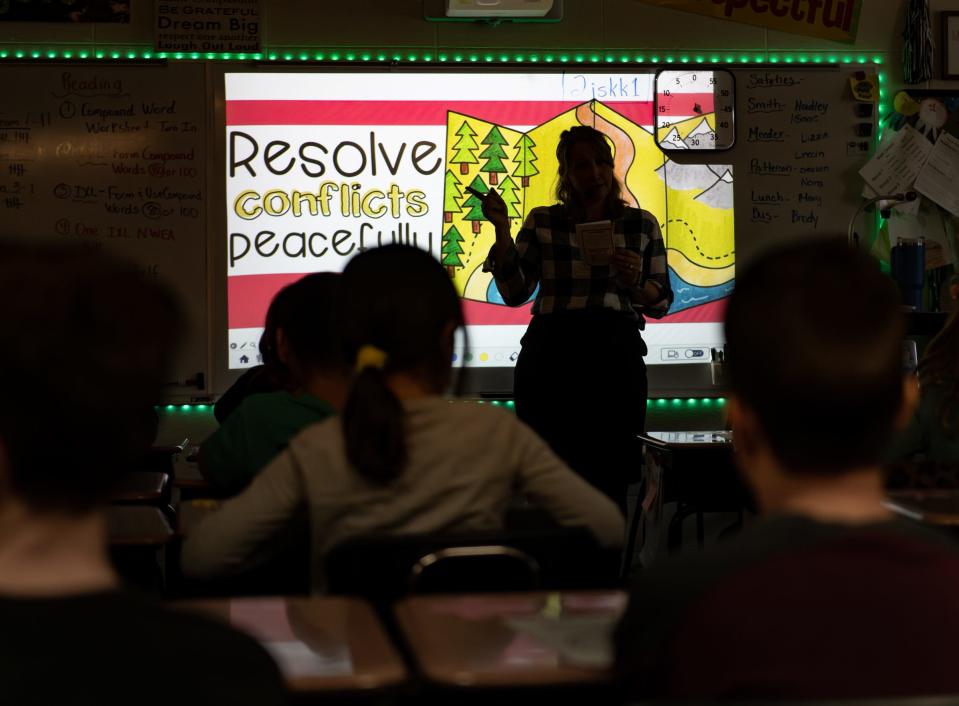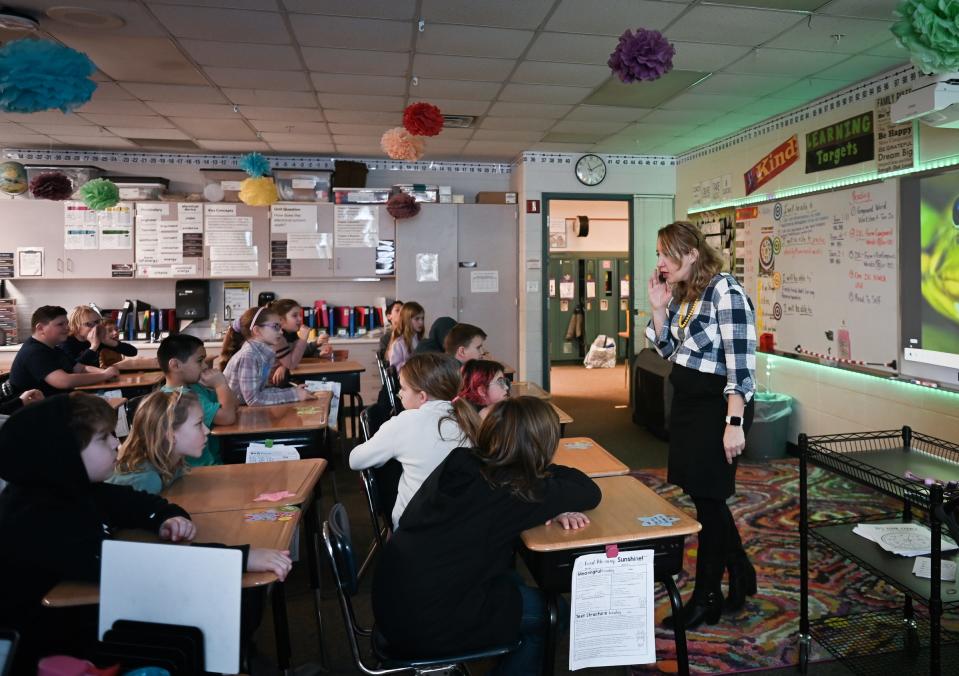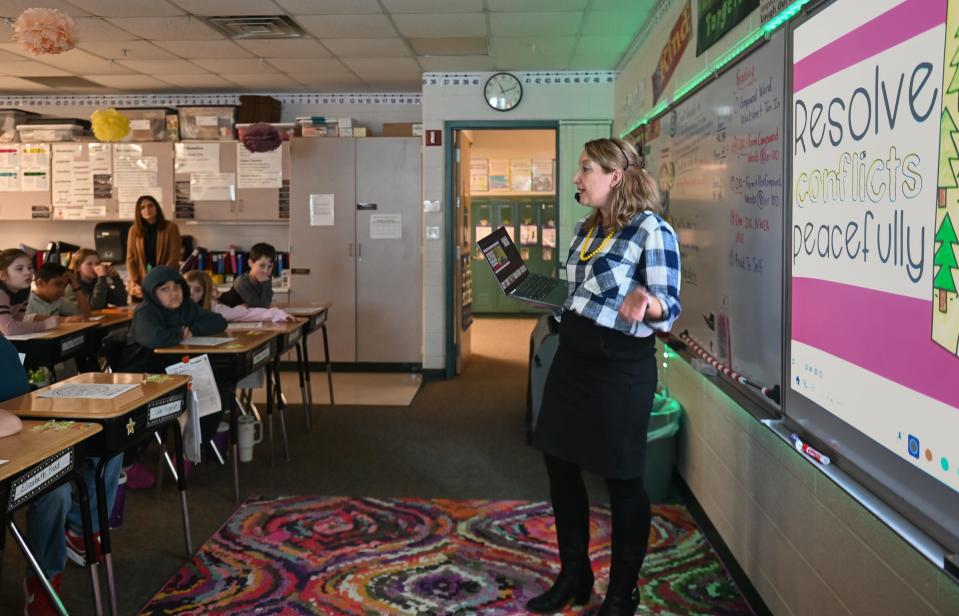Michigan has fewer school counselors per student than almost every US state. Why that matters
GRAND LEDGE — Felicity Heany, a fourth grader at Grand Ledge's Willow Ridge Elementary, said that when she starts to feel sad, she takes a few "dragon breaths."
"You smell the flower," she said, cupping her hands in front of her face. "And then you blow it all out in a big flame."
Felicity learned the technique from Willow Ridge's school counselor, Sarah Simons.
"This year, I've started doing weekly lessons in every class," Simons said. Each day of her week is full of working with students in classrooms across the Willow Ridge Elementary building.
Most elementary schools in the Lansing area do not have school counselors like Simons, but it's a problem that extends beyond mid-Michigan.
The American School Counselor Association recommends schools have one counselor for every 250 students. Michigan has the third-worst rate of school counselors to students in the nation as of 2022, said Terri Tchorzynski, president of the Michigan School Counselor Association. On average, each school counselor in Michigan is responsible for 615 students.
MISchoolData shows the average counselor to student ratio in each Michigan school district, and in Greater Lansing it ranges from 216 students per counselor in Charlotte Public Schools to 912 students per counselor in Maple Valley Schools. The data does not break down the counselors per school building.
Students without counselors, or not enough of them, are missing out on support for everything from academic guidance to interpersonal skills to mental health assistance, Tchorzynski said via email. That can directly impact their chances of success to pursue college or other academic programs after high school.
"If you're the only counselor for 1,000 students, I don't see how you could be effective," Simons said.
'I feel so much better'

Michigan school counselors need one of four certifications. The most common is a school counselor license after completing a master's degree in school counseling. Other options are a Michigan teaching certificate with the school counselor endorsement, a preliminary school counselor license, or a temporary school counselor license.
"Many of our students across the state do not have access to professionals that can holistically support them in the areas of academics, social-emotional and career development," Tchorzynski said.
Students with counselors who teach lessons become more self aware and are better able to handle interpersonal conflict, Simons said.
Anurag Kondekar, a fourth grader at Willow Ridge, said he learned how to talk through a problem with his friend that had been bothering him with what he learned from Simons.
"At recess, my friend wasn't letting me play with him 'cause he was with his other friends," Anurag said. "We talked it out ... he let me play after."
Jennifer Jockheck, a counselor at East Lansing High School, isn't in classrooms every day but is still there to provide emotional support for students who need it.
"There was a student, she was struggling with some stuff." Jockheck said. "She was crying and really upset in my office for an hour, and after she said 'I feel so much better.'"
With growing numbers of students struggling with their mental health, she said she believes it's necessary for schools to reevaluate how they're supporting children.
"During a time where the needs of our students are more extreme than ever before, we must invest in the resources and personnel that can best serve them," she said.
'Take on many roles'
Influxes of state and federal money in the past few years have allowed schools to hire more of them, meaning counselors now have more time to work with students in classrooms.
"At my previous district, I didn't have time to meet with students." Jockheck said.
Social and emotional health is a larger focus for schools today than it was even five years ago. Jockheck said the COVID pandemic, which drove up incidents of misbehavior and tardiness after students returned to the classroom, made schools realize the importance of mental health, and how it impacts a student's potential success.
"A kid could be a straight A student, but their mental health could be causing them to struggle, so you wouldn't see what they can do," she said.
Most schools still have their counselors scheduling students for classes. Tchorzynski said that is because school administrators don't understand the appropriate role of school counselors.
"If administrators, and even school counselors, are not aware of the 'new' guidelines, then they may find themselves operating under the archaic expectations of a guidance counselor," Tchorzynski said.
The guidelines were introduced in 2002, she said, and have gone through four revisions since. Appropriate duties for school counselors include advising and evaluating academic planning, interpreting state test scores, and providing counseling for students with attendance or behavior problems. Counselors should not be building the master schedule, solely maintaining student records or disciplining students.

Having the time and energy to be in classrooms allows school counselors to work with students on regulating emotions, deal with interpersonal issues and counsel students who are in crisis. These skills can directly impact a student's ability to learn.
"They're not going to be able to learn in class if they can't calm down, if they can't believe in themselves, and believe that they can do what they need to do," Simons said. "This way we're not sitting there stewing in class 45 minutes after something happens ... and we're actually learning in class."
Michigan was able to add more than 1,000 mental health professionals to schools in the past five years. The number of counselors statewide is still lagging significantly compared to the national average of 408 students per counselor.
'Not enough people to fill positions'

"Money isn't the issue when it comes to hiring school counselors," said Craig Kueffner, director of student supports at Mason Public Schools. "Number of people is."
Many schools in the Lansing area have added counselors due to influxes of state and federal money. Mason Public Schools was able to add counselors to its elementary schools for the first time.
"Counselors are in such demand, and there's not enough people to fill positions," Kueffner said. "We received a large grant from Ingham County to support and beef up mental health... It's fortunate that the state has identified this as such a need... But you also have to make sure you don't overextend with the money you have now so you don't have to make cuts later."
Steve Gabriel, assistant superintendent of academic services for Grand Ledge Public Schools, agreed that it is difficult for schools to hire and retain school counselors.
Gabriel said that over the past five years Grand Ledge has committed to hiring counselors as a priority. Every school in the district now has at least one counselor. Grand Ledge has a current district ratio of about 472 students per counselor.
"There is a statewide shortage of counselors," Gabriel said.
Counselors in Michigan make on average $50,000 to $60,000 a year according to Indeed.
Ratio doesn't tell the whole story

Most school districts also have social workers or other student support.
In East Lansing High School, two "student advocates" have been hired, Schwarzbek said. They help ensure that there is additional student support if issues arise.
"Having a diverse group of support staff allows our counselors to be able to be part of a team of individuals working to support our students and helps to ensure they don't feel alone in the process," Schwarzbek said in an email.
In Mason Public Schools, each of the six buildings has a full-time school social worker — one in each building — who provides some counseling services as well, said Alyson Kechkaylo, communications specialist for the Ingham Intermediate School District.
Mason students also receive mental health support from Ingham Intermediate School District in the form of a pair of mental health specialists, who team up to handle referrals from all six buildings.
What's the solution?
Tchorzynski said t is "imperative that we begin to think creatively" about how to attract future school counselors and how to retain the ones practicing now. The Student Mental Health Apprenticeship Program for Retention and Training, or SMART, was one step toward this goal.
The SMART Public Act was signed into law by Gov. Gretchen Whitmer to provide financial support to encourage more people to enter school-based mental health professions, such as school counseling. The state-funded act would provide paid work opportunities for graduate students to encourage them to pursue a career in the field.
Tchorzynski said more still needs to be done, and a "multi-pronged attack" is needed. This includes legislation by lawmakers, statewide advocacy, and an understanding of the appropriate role of school counselors.
"It is certainly time to make movement forward because our students are the ones suffering as a result," she said.
Contact Sarah Atwood at satwood@lsj.com, or follow her on X (formerly Twitter) @sarahmatwood
This article originally appeared on Lansing State Journal: Few Michigan school counselors mean kids are missing out, what can be done
